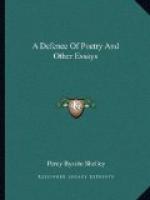The age immediately succeeding to that of Dante, Petrarch, and Boccaccio, was characterized by a revival of painting, sculpture, and architecture. Chaucer caught the sacred inspiration, and the superstructure of English literature is based upon the materials of Italian invention.
But let us not be betrayed from a defence into a critical history of poetry and its influence on society. Be it enough to have pointed out the effects of poets, in the large and true sense of the word, upon their own and all succeeding times.
But poets have been challenged to resign the civic crown to reasoners and mechanists, on another plea. It is admitted that the exercise of the imagination is most delightful, but it is alleged that that of reason is more useful. Let us examine as the grounds of this distinction, what is here meant by utility. Pleasure or good, in a general sense, is that which the consciousness of a sensitive and intelligent being seeks, and in which, when found, it acquiesces. There are two kinds of pleasure, one durable, universal and permanent; the other transitory and particular. Utility may either express the means of producing the former or the latter. In the former sense, whatever strengthens and purifies the affections, enlarges the imagination, and adds spirit to sense, is useful. But a narrower meaning may be assigned to the word utility, confining it to express that which banishes the importunity of the wants of our animal nature, the surrounding men with security of life, the dispersing the grosser delusions of superstition, and the conciliating such a degree of mutual forbearance among men as may consist with the motives of personal advantage.
Undoubtedly the promoters of utility, in this limited sense, have their appointed office in society. They follow the footsteps of poets, and copy the sketches of their creations into the book of common life. They make space, and give time. Their exertions are of the highest value, so long as they confine their administration of the concerns of the inferior powers of our nature within the limits due to the superior ones. But whilst the sceptic destroys gross superstitions, let him spare to deface, as some of the French writers have defaced, the eternal truths charactered upon the imaginations of men. Whilst the mechanist abridges, and the political economist combines labour, let them beware that their speculations,




